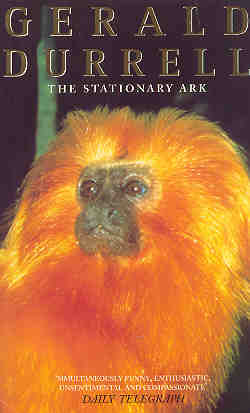The
Stationary Ark
Gerald Durrell

“It is a curious fact that animals which are extremely conservative about new foods as a rule, will, when they get to a zoo, with unerring accuracy go mad for the one food that will either do them the least good or the most harm. If they displayed this trait in their characters when they were newly caught, it would make the animal collector's lot a much easier one, for he would then have something to tempt them with. The lack of this can try his patience severely, for long before the animal arrives at the zoo the collector has the unenviable task of teaching it to accept a new diet. This is a task as fraught with difficulty and disillusionment as trying to inculcate the elements of French cuisine into the average English boarding-house.”
The passage quoted above is taken from one of writer / naturalist Gerald Durrell's many books. The Stationary Ark, for so it is titled, tells the story of the beginnings of the Jersey Zoo and the wonderful work it continues to do for animals and their habitats. The passage goes on:
“At the extreme end of the scale, there are the animals who are monophagous. They demand a monotony of diet so extreme that even a medieval saint would feel that it was carrying the mortification of the flesh too far. Pangolins or Scaly anteaters, for example, hailing from Africa and Asia, exist happily on a strict diet of ants, in some cases the black, indigestible-looking tree ants, who reek of formic acid to the extent that your eyes water when cutting up a nest.”
Gerald Durrell's life work came to fruition in the Jersey Zoo, which continues that work today. From promoting interest in wildlife conservation world-wide, to building up breeding colonies of the most endangered animals, to rescuing seriously threatened species, and studying the biology of these creatures with whom we share the planet, his legacy lives on in the Jersey Zoo. That legacy is wonderfully illustrated in The Stationary Ark (and in his many other books). Be sure to read all about it.
All Rights Reserved.